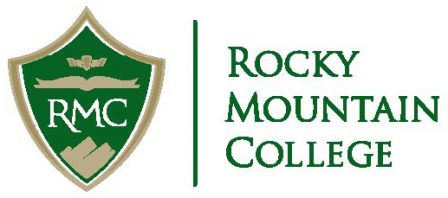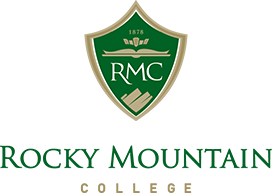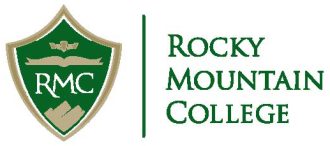Pre-Law Minor
February 3, 2022 2024-04-29 22:56Students planning to attend law school after completing a degree at Rocky Mountain College are encouraged to supplement their major with the pre-law minor. Along with the completion of all requirements for their major, pre-law students take core courses in government, law, and logic and choose among electives encompassing analytical reasoning, advanced writing, rhetoric, and ethics.
Required courses are intended to foster critical-thinking skills, develop advanced writing abilities, and acquire an understanding of the human condition as it relates to the issues of legal and social justice. Students in the program will also receive assistance with LSAT test preparation and the law school application process.
Students who participate in the 3+3 Law School Admission Program have the opportunity to earn their bachelor’s degree from Rocky Mountain College and law degree from the University of Montana in six years rather than the traditional seven.
Minor Learning Outcomes
Students who graduate with a minor in pre-law will be able to:
- Use logical deduction to interpret quantitative and/or qualitative data in order to analyze real-world problems;
- Demonstrate well-developed skills in reading closely, thinking critically, and communicating effectively in writing;
- Demonstrate the ability to support arguments and reason soundly;
- Analyze statutory language and case law, with a focus on the interpretive nature of legal reasoning;
- Critically evaluate the complexities of the criminal justice system in the United States;
- Evaluate, interpret, and brief landmark Supreme Court decisions, including concurring and dissenting opinions; and
- Write essays, papers, and/or legal briefs essentially free of errors in grammar, mechanics, and spelling.
Minor in Pre-Law
A minimum of 21 semester hours is required, including:
Core Courses:
POL 203: American National, State, and Local Government
POL 412: Constitutional Law
Analytical Reasoning – select one of the following:
MAT 152: To Infinity and Beyond
MAT 210: Probability and Statistics
PHR 205: Logic
Advanced Writing – select one of the following:
ENG 205: Introductory Creative Nonfiction Writing
ENG 325: Professional Writing
ENG 359: History of Grammar and English
Rhetoric – select one of the following:
COM 306: Organizational Communication
COM 325: Theories of Persuasion
COM 418: Rhetorical Theory and Criticism
Electives – select two of the following:
AVS 312: Aviation Law
BSA 331: Business Law
IDS 304: Negotiations
IDS 305: Mediation
PHR 303: Ethics
PSY 330: Psychology and Law
SOC 321: Criminology
SOC 342: Deviance
SOC 343: Punishment and Society
or other relevant special topics course with permission of faculty.
3+3 Law School Admissions Program
This program allows qualifying students to attend Rocky Mountain College for three years (minimum 90 credits) and enter the University of Montana Alexander Blewett III School of Law during their fourth year of undergraduate study. After successful completion of the first year of law school (30 credits), the student will be awarded a bachelor’s degree from Rocky Mountain College, assuming other graduation requirements are met. The juris doctor degree will be awarded by the University of Montana upon successful completion of the required minimum 90 total course credits for law school and all other J.D. requirements.
The 3+3 program is open to students of all majors. Students must earn admission to the law school in accordance with the normal competitive process, and there is no guarantee of admission based on participation in the 3+3 program. Participants must complete all core curriculum requirements, requirements for their major, and the pre-law minor within three years to be eligible for 3+3 admission.
AVS 312 – Aviation Law
Semester: Spring
Semester hours: 3
This course provides a forum for understanding the statutes, regulations, and case law governing aviation. Topics of study include administrative law, FAA enforcement, aviation medical issues, business organizations, airline liability, aircraft accidents, aircraft transactions, and airline labor law.
Prerequisite: sophomore standing
BSA 331 – Business Law
Semester: Fall
Semester hours: 3
A course that explores the legal principles relating to business transactions contracts, sales, commercial paper, intellectual property, and e-commerce. A study of the legal environment of business is emphasized.
Prerequisite: ACC 210, ECO 205
COM 306 – Organizational Communication
Semester: Fall
Semester hours: 3
This course examines how communication occurs in large cooperative networks, especially in professional work settings. It focuses on the roles leadership, management, and conflict resolution play in larger organizations. By the end of the course, students will understand how the values and cultures of any organization emerge through communication.
Prerequisite: COM 202 or permission of instructor
COM 325 – Theories of Persuasion
Semester: Spring; Odd years
Semester hours: 3
This course will examine multiple theories of persuasion through examination of artifacts in popular culture including advertising campaigns, media, the Internet, and organizations. The course will explore how persuasive messages are constructed and delivered to the general public. Major topics in this course will include persuasion theory, argumentation, ethics, and critical approaches of persuasion theory.
COM 418 – Rhetorical Theory and Criticism
Semester: Fall; Odd years
Semester hours: 3
This course builds on the historical foundations of rhetoric, focusing on contemporary rhetorical theories. Students will examine rhetorical artifacts through a variety of theoretical lenses, including narrative metaphoric, and feminist theories, in order to better understand and explain social, political, and cultural conditions.
Prerequisite: COM 202, one 300-level COM course
ENG 205 – Introductory Creative Nonfiction Writing
Semester: Fall
Semester hours: 3
This workshop course focuses on the conventions and forms of creative nonfiction. Topics include scene, reflection, character, metaphor, and other fundamentals; specific forms include flash, lyric essay, and memoir. Students will read the work of accomplished authors, complete numerous and varied writing exercises, read and critique the work of their peers, and write and revise several graded assignments.
Prerequisite: ENG 119
ENG 325 – Professional Writing
Semester: Fall and Spring
Semester hours: 3
This course teaches concepts, practices, and skills for communicating technical, scientific, or business-related information. Topics include understanding how people read, designing documents, incorporating graphics, writing about statistical results, rewriting, editing, and using the Internet. This course may be especially helpful for non-English majors, providing them with the tools and techniques to communicate their messages effectively.
Prerequisite: ENG 119
ENG 359 – History and Grammar of English
Semester: Fall; Alternate years
Semester hours: 3
Students are introduced to the linguistic and theoretic approaches to the study of English, including phonology and morphology. Students pursue an in-depth study of syntax, focusing on the grammar of words, phrases, clauses, and sentences. Students also review the history of English from proto-Germanic to the development of regional dialects, cultural variations, and “global” English.
IDS 304 – Negotiations
Semester: Fall
Semester hours: 3
Negotiation is the art and science of securing agreements between two or more interdependent parties. The purpose of this course is to understand the theory and processes of negotiations as it is practiced in a variety of settings. The course highlights the component of an effective negotiation and teaches students to analyze their own behavior in negotiations. The course has a strong experiential component, providing students with an opportunity to develop their skills by participating in negotiations and integrating their experience with the principles presented in the assigned readings and lectures.
IDS 305 – Mediation
Semester: Spring
Semester hours: 3
Mediation is an interdisciplinary field. Mediators come from all disciplines and walks of life. A potential mediator ought to possess the patience of Job, the hide of a rhinoceros, and the wisdom of Solomon. Mediation is an alternative to a decision rendered by a judge, arbitrator, or other decision-maker. Mediators help the parties in a dispute to engage in constructive and creative communication, which allow them to explore the issues and reach a mutually acceptable resolution of their dispute. The goal of the course is to provide those basic skills necessary to further pursue mediation, either as a profession or as another arrow in the student’s quiver of practical and life skills.
MAT 152 – To Infinity and Beyond
Semester: Offered at discretion of department
Semester hours: 3
Exploration of a variety of modern mathematical topics. Topics will illustrate mathematics as a way of representing and understanding patterns and structures, as an art, as a tool, in other disciplines, and as a historical force. Topics may include infinity, chaos, fractals, symmetry, networks, and others.
Prerequisite: MAT 100 or the equivalent
MAT 210 – Probability and Statistics
Semester: Fall, Spring, and Summer
Semester hours: 3
This course provides a non-calculus-based study of discrete probability theory and its statistical applications. Distribution theory and its applications in hypothesis testing and setting confidence intervals are discussed.
Prerequisite: MAT 100 or satisfactory score on a placement exam
PHR 205 – Logic
Semester: Offered at discretion of department
Semester hours: 3
An introductory course in the principles and methods used to distinguish correct from incorrect reasoning. This course aims to help students think and read critically and to write argumentative papers. Both inductive and deductive logic will be studied.
PHR 303 – Ethics
Semester: Spring; Alternate years
Semester hours: 3
A study relating ethics, as traditionally conceived in philosophy, to one or more current philosophical works in ethics. This course will provide students with a solid background in ethics, from Plato to Nietzsche. A discussion of a contemporary work in ethics will introduce students to topics that may be covered in depth in later seminars.
POL 203 – American National, State, and Local Government
Semester: Spring
Semester hours: 3
This course provides an analysis of the American system of government on three levels. Students will examine the origins of our system of government, the nature and role of our Constitution with its functional and territorial distribution of powers, and the importance of government at the three levels.
POL 412 – Constitutional Law
Semester: Fall; Alternate years
Semester hours: 3
A case-method approach to the landmark decisions of the Supreme Court, with an emphasis on the doctrine of judicial review and the role of the Court in interpreting the Constitution and shaping American legal culture. The course will focus on the exercise and limitations of federal power in the areas of the economy, civil rights, and individual liberties, as well as the Constitutional basis on which statutes and other regulatory provisions are adjudicated. Special attention will be given to Constitutional clauses related to free speech, due process, and equal protection under the law.
PSY 330 – Psychology and Law
Semester: Fall; Offered at discretion of department
Semester hours: 3
This course is an introduction to some of the ways in which psychological research, theory, and practice is applied to the legal system and issues of law. Topics covered in this course include why people commit crimes, the accuracy of eyewitness testimony, what it means to be found “not guilty by reason of insanity,” and false and coerced confessions, among others.
Prerequisite: PSY 101
SOC 321 – Criminology
Semester: Spring; Alternate years
Semester hours: 3
This course focuses on the nature and extent of crime and delinquency, including a historical survey of explanatory theories focusing on the economic, social, and psychological causes of criminal behavior and current methods of treatment, policy, and prevention.
Prerequisite: SOC 101 or SOC 225
SOC 342 – Deviance
Semester: Spring; Alternate years
Semester hours: 3
This course investigates deviant (normative and statistical) social behavior. A variety of psychological, economic, sociological, and anthropological theories are used to analyze the causes, consequences, and social responses to behaviors such as sexual violence, suicide, mental illness, illegal drug use, homosexuality, and heterosexual deviance.
Prerequisite: SOC 101 or SOC 225
SOC 343 – Punishment and Society
Semester: Fall; Alternate years
Semester hours: 3
This course examines the complexities of punishment in the United States from colonial times to the present. It considers the types of behavior we punish, why we punish, how we punish, and whom we punish. Through a detailed analysis of the criminal justice system, the course evaluates the approaches of the United States to crime prevention, incarceration, and dealing with terrorism. We look at the history of punishment, study the birth of the modern prison, and consider various theories of criminology and the social natura of explanations of punishment. We then explore the massive growth of the prison population in the U.S. at the end of the twentieth century.
Prerequisite: SOC 101 or SOC 225
Matthew O’Gara, Professor and Pre-Law Advisor
Contact
Rocky Mountain College
1511 Poly Drive
Billings, MT 59102


